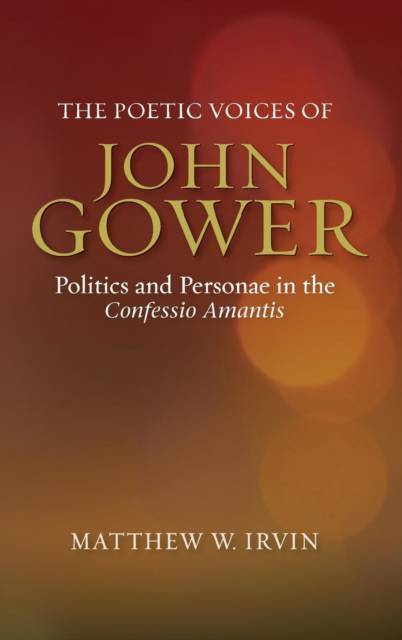
Je cadeautjes zeker op tijd in huis hebben voor de feestdagen? Kom langs in onze winkels en vind het perfecte geschenk!
- Afhalen na 1 uur in een winkel met voorraad
- Gratis thuislevering in België vanaf € 30
- Ruim aanbod met 7 miljoen producten
Je cadeautjes zeker op tijd in huis hebben voor de feestdagen? Kom langs in onze winkels en vind het perfecte geschenk!
- Afhalen na 1 uur in een winkel met voorraad
- Gratis thuislevering in België vanaf € 30
- Ruim aanbod met 7 miljoen producten
Zoeken
The Poetic Voices of John Gower
Politics and Personae in the Confessio Amantis
Matthew Matthew Irvine
€ 209,45
+ 418 punten
Omschrijving
Gower's use of the persona, the figure of the writer implicated in the text, is the main theme of this book. While it traces the development of Gower's voice through his major works, it concentrates on the dialogue of Amans and Genius in the Confessio Amantis. It argues that Gower negotiates problems of politics and problems of love by means of an analogy between political ethics and the rules of fin amour; Amans and Genius are both drawn from and occupied with amatory and ethical traditions, and their discourse produces a series of attempts to find a coherent and rational union of lover and ruler. The volume also argues that Gower's goal is poetic as well as political: through the personae, Gower's readers experience the pains and pleasures of erotic and social love. Gower's personae voice potential responses to exemplary experience, prompting readers to feel and to judge, and moving them to become better lovers and better rulers.
Specificaties
Betrokkenen
- Auteur(s):
- Uitgeverij:
Inhoud
- Aantal bladzijden:
- 328
- Taal:
- Engels
- Reeks:
- Reeksnummer:
- nr. 9
Eigenschappen
- Productcode (EAN):
- 9781843843399
- Verschijningsdatum:
- 20/02/2014
- Uitvoering:
- Hardcover
- Formaat:
- Genaaid
- Afmetingen:
- 156 mm x 234 mm
- Gewicht:
- 639 g

Alleen bij Standaard Boekhandel
+ 418 punten op je klantenkaart van Standaard Boekhandel
Beoordelingen
We publiceren alleen reviews die voldoen aan de voorwaarden voor reviews. Bekijk onze voorwaarden voor reviews.









